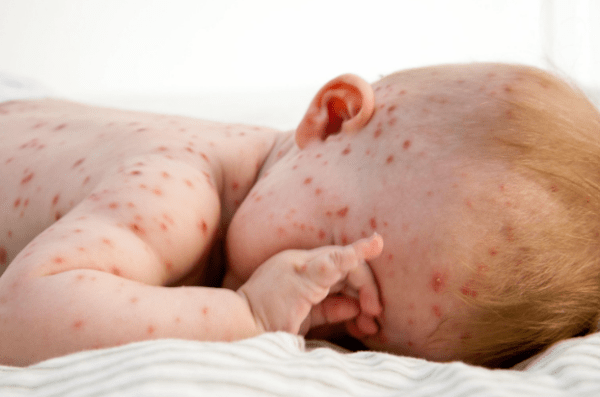Chickenpox is very common. It is caused by a virus called varicella. If your child has been in contact with someone who has chickenpox it can take 2 to 3 weeks for them to develop the rash. Children can pass the virus to others from the day before the rash appears until the last spot has scabbed over. Your child may also have a temperature, a cough and a runny nose.
Chickenpox starts with red bumps that become small, yellowish blisters. The spots can affect the whole body including the mouth and genitals (which can be very painful). They then open before scabbing over.

Visit the NHS website for more pictures of how the rash develops.
Most children with chickenpox can be looked after at home and do not need to see a doctor. If your newborn baby or child with a weak immune system (for example due to cancer treatment, immunosuppressive treatment or genetic immunodeficiency) catches chickenpox then you should contact a doctor.
The chickenpox vaccine
The chickenpox vaccine is a vaccine used to prevent catching and spreading the disease. From 1 January 2026, the NHS is adding protection against chickenpox to the routine childhood vaccination programme.
This is done using one combined vaccine called MMRV, which protects against four illnesses (Measles, Mumps, Rubella and Chickenpox – also known as Varicella) in one vaccine.
A catch-up vaccination programme for children born from 1 January 2020 to 31 December 2024 will run between November 2026 to March 2028.
What vaccine will your child be offered?
| When your child was born | When they will receive MMRV vaccine |
| On or after 1 January 2025 |
MMRV at 12 months MMRV at 18 months |
| Between 1 July 2024 and 31 December 2024 |
MMRV at 18 months MMRV at 3 years 4 months |
| Between 1 September 2022 and 30 June 2024 | MMRV at 3 years 4 months |
| Between 1 January 2020 and 31 August 2022 |
One catch-up MMRV dose (during catch-up vaccination programme) |
| On or before 31 December 2019 | No MMRV offer |
- Chickenpox can be serious, especially for babies, pregnant women and people with weak immune systems.
- It is safe for your child to have the MMRV vaccine even if they have already had chickenpox.
- There is no chickenpox-only vaccine offered as part of the NHS routine programme.
- Some children may have vaccines containing MMR more than twice over time – this is safe.
- The chickenpox vaccine has been used successfully for several years in Canada, USA, Australia and Germany.
More information is available here.
What are the symptoms of chickenpox?
- Itchy, spotty rash
- High temperature
- Aches and pains
- Loss of appetite
- General feeling of being unwell
What can you do to help your child?
- Paracetamol for a high temperature or pain
- Antihistamines (for example piriton) can help with itching and sleep
- Plenty to drink
- Try ice lollies or jelly if your child is not drinking much
- Try an oat bath. Put a handful of porridge oats in a small cloth bag or a sock. Tie it at the top and place this in their bath
- Pat dry after bath rather than rubbing
- Dress in loose clothes
- Avoid scratching. Keep nails short or apply hand mittens at night to reduce damage to the skin
- Don’t give ibuprofen unless advised to by a doctor
- Speak to your local community pharmacist for advice on what can help with itching
How long does it last?
- Usually the last spot has crusted over by 5-7 days after the rash first appears
- It is easily passed to other people until spots have dried and scabbed over
- Avoid nursery or school for 5 days from the start of the rash or until all spots are fully scabbed over
- Avoid contact with newborn babies
- Avoid contact with pregnant women (unless they have already had chickenpox) and people with a weakened immune system
- Now that your child has had chickenpox, they will usually be immune for life. The virus lives in the body forever (in the nerve roots) and may come back at some point in life as shingles. You cannot catch shingles from chickenpox.
